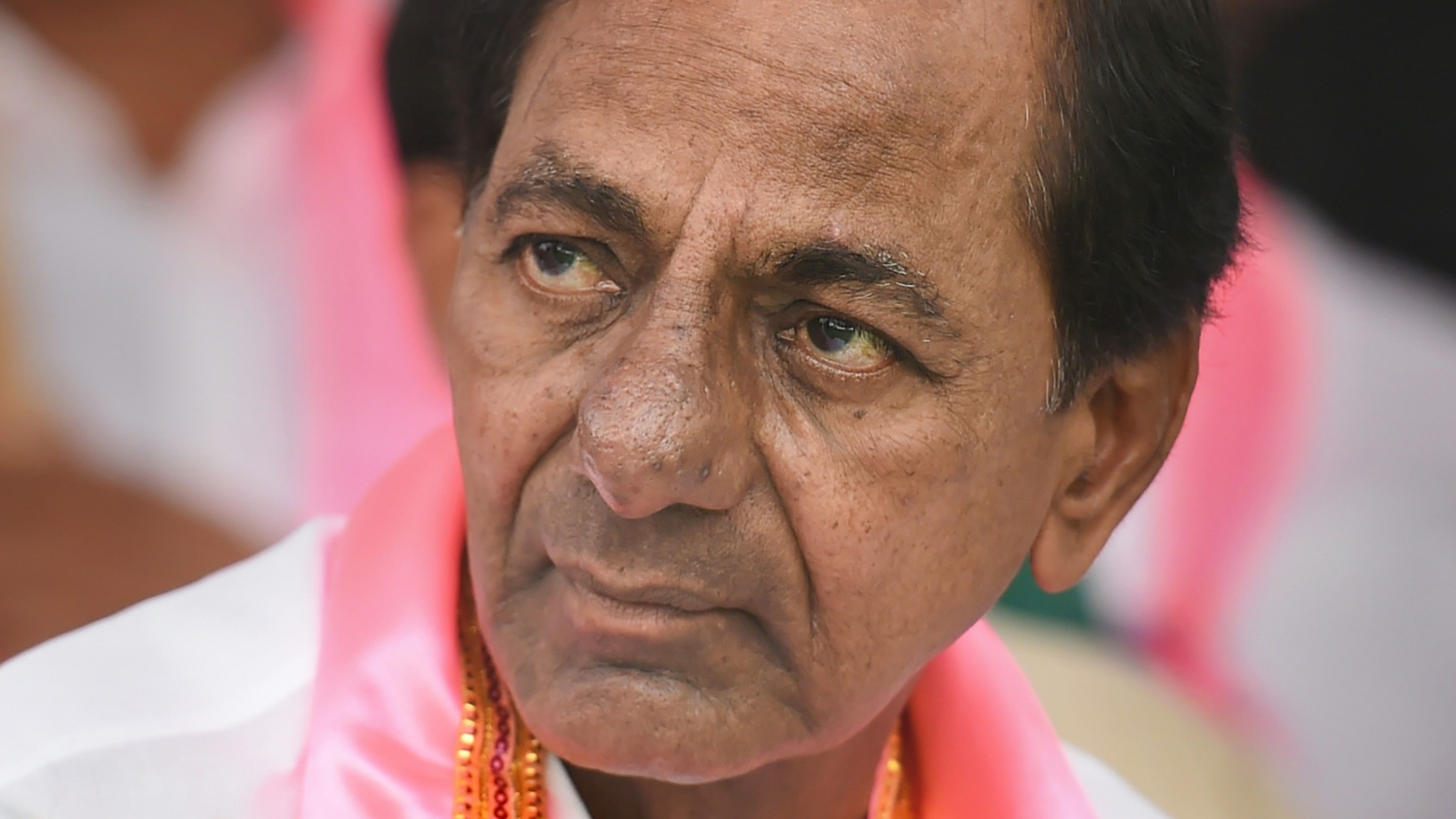
K Chandrashekar Rao.
Credit: PTI File Photo
The Bharatiya Rastra Samiti (BRS), formerly known as the Telangana Rastra Samiti (TRS), has played a crucial role in the formation and early development of Telangana.
In 2001, K Chandrashekar Rao quit the Telugu Desam Party (TDP) and founded the TRS. It rose to prominence once the Congress-led UPA government announced the formation of a separate Telangana state. In the 2014 Assembly polls, the TRS won 63 seats, with a vote share of 34 per cent. Rao formed the state’s first government and in the 2018 Assembly polls won 88 seats and secured ~47 per cent F votes.
Rao’s political ambitions soared and with an eye on national politics, in 2022 he changed the name of the party to its current one. However, in the 2024 Assembly polls the BRS’ seat tally fell to 39, with a vote share of 37 per cent. In the general elections, the BRS failed to win even one seat.
As the political landscape has evolved, the BRS now faces the challenge of maintaining its relevance and dominance in the region.
With the two national parties, the Congress and the Bharatiya Janata Party (BJP), focusing their energies to establish their governments in the state, the political landscape has become highly competitive.
To reemerge as a strong regional force, the BRS needs to revisit its roots and re-engage with civil society organisations, especially those who were vital allies during the statehood movement.
By reaffirming its commitment to Telangana’s identity, emphasising its development work, addressing the concerns of marginalised communities, and fostering open dialogue with critics, the BRS can reinvigorate its regional appeal and establish a stronger connection with the people of Telangana.
Introspection needed
The demand for a separate Telangana was more than an administrative issue; it was a movement rooted in identity, self-respect, and the desire for socio-economic uplift of the region.
By highlighting the cultural, historical, and linguistic uniqueness of Telangana, the BRS can rekindle the spirit of regional pride that helped secure its initial popularity.
Emphasising Telangana’s self-respect and taking a stance on issues that resonate deeply with the people of the state can foster a renewed sense of loyalty among the population.
Since 2014, the BRS has overseen significant transformation in Telangana, with notable progress in infrastructure, irrigation, agriculture, and social welfare schemes. The Kaleshwaram Lift Irrigation Project, Mission Bhagiratha, and Mission Kakatiya have had a visible impact on the lives of Telangana’s rural population.
Social welfare schemes, such as Rythu Bandhu for farmers, KCR Kits for maternal healthcare, and Dalit Bandhu for the economic empowerment of the Dalits, have been pivotal. However, the BRS has failed at publicising these achievements.
For the BRS to strengthen its support base, it must proactively address the issues concerning the Scheduled Castes (SCs), the Scheduled Tribes (STs), and the Other Backward Classes (OBCs).
By offering more targeted policies and quotas, ensuring the implementation of existing reservations, and advocating for the rights of these communities, the BRS can establish itself as a true representative of the marginalised voices.
Actively involving SC/ST/OBC leaders within the party’s ranks and elevating their voices in the decision-making process will also demonstrate its commitment to social justice and equality.
Re-engaging Civil Society Organisations
During the struggle for statehood, civil society organisations played a vital role in mobilising public opinion, organising protests, and building solidarity across Telangana. Rao should rekindle the party’s alliance with these groups, especially as they possess a unique connection to grassroots issues.
By fostering partnerships with these groups, the BRS can maintain an active dialogue with the public, stay informed on emerging issues, and address concerns before they become points of contention.
The BRS’s ability to maintain a healthy democracy within the party and the state depends on its openness to criticism and its willingness to adapt. By adopting a transparent and responsive approach, the BRS can create an environment where constructive feedback from both within and outside the party is valued.
Such an approach can help BRS to dispel any perception of authoritarianism, showcasing it as a party committed to representing all of Telangana’s people.
Finally, the BRS must articulate a forward-looking vision for Telangana. This vision should go beyond immediate electoral promises and address the broader goals of education, employment, healthcare, environment, and technology.
Through public consultations and engagement with experts, BRS can create a people-driven policy agenda that aligns with the aspirations of modern Telangana.
The BRS has the potential to re-emerge as the dominant political force in Telangana if it is willing to revisit its founding principles and engage meaningfully with the public.
By reconnecting with the spirit of Telangana’s identity, addressing the concerns of marginalised communities, and embracing dialogue with critics, the BRS can position itself as a representative of the people’s aspirations.
(G Kiran Kumar, National President, All India OBC Students Association (AIOBCSA)).
Disclaimer: The views expressed above are the author's own. They do not necessarily reflect the views of DH.